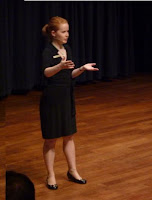Last week was very exciting! On a very short notice we organised two informal discussions at a wine bar in central London about what membership in London is about, where we want it to go, and how we can take it to the next level. One group met on Tuesday and another on Thursday, both about 7-8 people, a mix of council members, long time members, new members and non-members - all of them pitching in with their view on things. It was awesome!
JCI London has gone through a lot of changes the last couple of years, and the growth in members (from 41 in 2008 to 130 (and counting) in 2010) and in numbers of events are the changes that have made the most impact on how we function and what we offer our members. Are we the best we can be? What can we do better? What would the ideal organisation look like and what has to be true for that to happen?
The two discussion meetings were quite different, not so much in energy but the focus in each meeting was different, and I was the only person present at both meetings. I asked the people present to discuss our ambition to be the greatest chamber, what does that mean? To our members? To London? How can we get there?
One thing both meetings looked into was the difference between long term and short term benefits. We're not a short term benefits organisation, but most members join us for the short term benefits, then stay for the long term benefits... During the discussions at the first meeting I was inspired to write the tag lines below, and its now going into the national newsletter here in the UK as a definition of what JCI is not... I know its not good to focus on "nots", and not good to write "buts", but (yeah yeah) here I feel it works....
We’re not a networking organisation…
…but through us you’ll build a network of ambitious future leaders and friends that will last you a lifetime
We’re not Toastmasters…
…but through us you’ll get training in public speaking and presentations and the opportunity to practice in front of a variety of audiences locally, nationally and internationally
We’re not a CPD organisation…
…but through us you’ll get professional and personal development cheaper than with any other comparative organisation (and you can even log it as CPD hours)
(CPD means Continuous Professional Development and is a means for professionals to maintain their skills. Many companies and organisations in the UK require employees to log a certain number of CPD hours per year, obviously logging those hours through JCI is both cheap to the company and a lot more fun to the employee!)
If you have ways to make this text better, or suggestions to how it could flow, please feel free to share them with me in the comments!
I'll come back with another post on the outcome of this whole process later, I need to share it with my council first, but I just couldn't wait sharing at least a tiny bit....its all so much fun!




